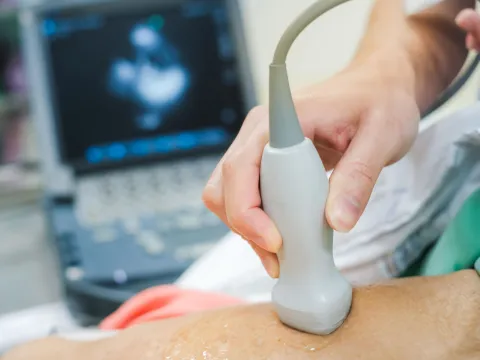- AdventHealth Cardiology Team

Choose the health content that’s right for you, and get it delivered right in your inbox.
An echocardiogram, also known as an “echo,” is a test that uses sound waves to produce live images of your heart. It allows your doctor to monitor how your heart and its valves are working.
An echocardiogram is vital to determine your heart muscle’s health, especially after a heart attack. It can also reveal heart defects or irregularities in unborn babies during a fetal echocardiogram.
You might need an echocardiogram if you’re at risk for heart disease, to monitor your heart valve over time or to track how well any medical treatments are working. We’re here to help you learn more about echocardiograms and how to prepare for them.
What Does an Echocardiogram Show?
The results of an echocardiogram can show the following:
- Abnormal cardiac chamber size
- Blood clots in the heart
- Damage to the heart muscle
- Heart defects
- Pressure in the heart
- Problems with pumping function
- Stiffness of the heart
- Valve problems
If there are concerns about your heart, your doctor may refer you to a cardiologist. More physical exams might be needed before they can make an official diagnosis.
If you’re diagnosed with a heart condition, your doctor will work with you to develop a personalized treatment plan that takes your whole health into account.
4 Types of Echocardiograms
The type of echocardiogram you get depends on the information your physician is looking for. Rest assured that getting an echocardiogram is painless, and the risks are small.
What are the four types of echocardiograms? Here is a handy breakdown as a guide.
Transthoracic Echocardiogram
In this standard echocardiogram:
- A technician spreads gel on a device and presses it firmly against your skin, aiming an ultrasound beam through your chest to your heart
- The device records the sound wave echoes from your heart
- A computer converts the echoes into moving images on a monitor
If your lungs or ribs block the view, you may need a small amount of an enhancing agent, called contrast, injected through an intravenous (IV) line. The contrast will make your heart's structures show up more clearly on a monitor.
Transesophageal Echocardiogram
If your doctor wants more detailed images, or it's difficult to get a clear picture of your heart with a standard echocardiogram, you may need a transesophageal echocardiogram.
In this procedure:
- Your throat will be numbed, and you'll be given medication to help you relax
- A flexible tube containing a transducer is guided down your throat and into the tube connecting your mouth to your stomach
- The transducer records the sound wave echoes from your heart
- A computer converts the echoes into detailed moving images of your heart, which your doctor can view on a monitor
Doppler Echocardiogram
Sound waves change pitch when they bounce off blood cells moving through your heart and blood vessels. These Doppler signals can help your doctor measure the speed and direction of the blood flow in your heart.
Doppler techniques are typically used in transthoracic and transesophageal echocardiograms. Doppler techniques can also be used to check blood flow problems and blood pressure in the arteries of your heart — which traditional ultrasound might not detect.
Stress Echocardiogram
Some heart problems occur only during physical activity. Your doctor might recommend a stress echocardiogram to check for coronary artery problems. However, an echocardiogram can't provide information about any blockages in the heart's arteries.
In a stress echocardiogram:
- Ultrasound images of your heart are taken before and immediately after you walk on a treadmill or ride a stationary bike
- If you're unable to exercise, you may get an injection of a medication to make your heart pump as hard as if you were exercising
Be sure to wear comfortable clothes if you’re doing a stress echocardiogram.
How Do You Prepare for an Echocardiogram?
If you’re wondering, “How do I prepare for an echocardiogram,” know that you’ll have the opportunity to ask questions after your doctor explains the procedure to you.
There should be no significant discomfort during your echo, other than a cool feeling and slight pressure from the device. It should take less than an hour. You’ll change into a hospital gown upon arrival. It’s best to leave valuables at home.
Here are some frequently asked questions about how to prepare for an echocardiogram:
Can I Eat Before an Echocardiogram?
For most echocardiograms, you can eat or drink as usual before the test. For some echoes, like a stress echocardiogram, you’ll be asked to fast with no food or drink for 4 to 8 hours before the test.
Can I Exercise Before an Echocardiogram?
Avoid cardio exercise or physical activity that can significantly raise your heart rate before your echo.
Can I Smoke Before an Echocardiogram?
Avoid smoking or using any nicotine products before an echocardiogram.
Can I Drink Caffeine Before an Echocardiogram?
It’s best not to have caffeinated drinks, including decaffeinated varieties, such as tea, coffee, fizzy drinks, energy drinks, alcohol, chocolate or medications containing caffeine 12 hours before the scan. These raise your heart rate and can skew the test’s results.
Will Medications Affect My Echocardiogram?
Follow your doctor’s advice about whether or not to take your usual medications on the day of the test.
Your Heart Is in the Right Place With AdventHealth for Your Echocardiogram
Imaging techniques like echocardiograms are key to detecting, diagnosing and treating your illness or injury. At AdventHealth, we offer a full spectrum of clinical diagnostic and therapeutic medical imaging services from routine X-rays and ultrasounds to advanced MRIs.
Learn more about AdventHealth Heart and Vascular Care options and find an AdventHealth location near you.
Medically Reviewed By

Dr. Jeffrey Kuhlman
Dr. Jeffrey Kuhlman is Senior Vice President and Chief Quality and Safety Officer for AdventHealth. Before joining AdventHealth, he served for 30 years as a Navy Physician, spending 16 years with the President and the White House as Physician to the President, Director of the White House Medical Unit, White House Physician and Senior Flight Surgeon for Marine One. Dr. Kuhlman is triple board-certified in aerospace, family and occupational Medicine. He is board-certified in medical management, was awarded a certificate in traveler’s health and holds credentials as a Certified Professional in Patient Safety and a Certified Physician Executive.
Learn more about Dr. Kuhlman’s extensive experience and contributions on AdventHealth Press, AdventHealth Research Institute, AHU Board of Trustees, and his Wikipedia profile.
About the Author
AdventHealth Cardiology Team
The AdventHealth Cardiology Team is dedicated to providing exceptional care for heart health, offering advanced diagnostic services, personalized treatments, and innovative procedures. We are committed to helping you achieve a healthy heart for life.
The in-house editorial team at AdventHealth produces evidence-based, accurate, and accessible content, leveraging expert input from clinicians and subject matter experts.




